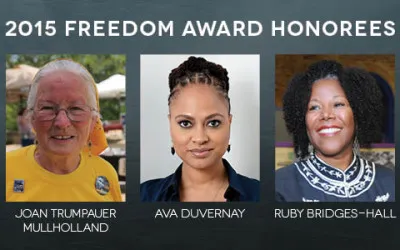By Terri Lee Freeman, Museum President
In 1991 the National Civil Rights Museum began a tradition of taking the time to honor the ordinary people who did extraordinary things to secure, preserve and protect the rights guaranteed to all citizens of our great nation through the Constitution. These were the foot soldiers of the American Civil Rights Movement that fought for justice and equality.
It was for these freedom fighters that the Freedom Award was born. In that first year, it was awarded to Coretta Scott King, James Farmer and Rosa Parks. To say “thank you,” to individuals who selflessly stood their ground to make life better for generations they would never see, was our duty.
Over the years, the National Civil Rights Museum has had the opportunity to honor many of the faces of those warriors of freedom depicted in the Museum’s exhibits. Some were names we readily recognized like the honorable Thurgood Marshall, Dr. Benjamin Hooks, Congressman John Lewis, the Dalai Lama and Myrlie Evers-Williams. But the Freedom Award has honored those who may have been less familiar to some — Geoffrey Canada, Dr. Muhammad Yunus, and Rev. Ed King — no less instrumental in the fight for justice and human rights.
This year, the Freedom Award tradition continues, recognizing three who have contributed to changing the legal landscape as well as raising awareness of the inequalities that existed in the past, and in some instances continue to persist today.
 Ruby Bridges Hall – Forever preserved in the Norman Rockwell rendering of her being protected by U.S. Marshalls as she entered her new elementary school. Little did she know, at six-years old, that she would be remembered in history books as a freedom fighter for equality. Little Ruby became the literal “poster child” for the desegregation of the New Orleans public school system. Today, through her Ruby Bridges Foundations, she promotes and encourages the values of tolerance, respect and appreciation of all differences.
Ruby Bridges Hall – Forever preserved in the Norman Rockwell rendering of her being protected by U.S. Marshalls as she entered her new elementary school. Little did she know, at six-years old, that she would be remembered in history books as a freedom fighter for equality. Little Ruby became the literal “poster child” for the desegregation of the New Orleans public school system. Today, through her Ruby Bridges Foundations, she promotes and encourages the values of tolerance, respect and appreciation of all differences.
Ava DuVernay – Her big screen rendition of the fight for voting rights, the death of Jimmy Lee Jackson, the tension between the Student Nonviolent Coordinating Committee and the Southern Christian Leadership Council, and the march at the Edmund Pettus Bridge, known as Bloody Sunday, familiarized an entirely new generation with the long and terror-filled fight for the right to vote. Ms. DuVernay continues to provide a vehicle for women and minorities to be creative and speak “truth to power” through her film distribution company, ARRAY.
Joan Trumpauer Mullholland – As a child, Ms. Trumpauer Mullholland recognized the world she was growing up in did not mirror what she was taught in Sunday School. So, as a young college student, her belief in right over wrong was demonstrated through her participation in the sit-ins, the Freedom Rides and the March on Washington. In her own right, she was a trailblazer, as the first non-black student at Tugaloo College in Mississippi.
These women are symbols of a movement that continues today. So is the National Civil Rights Museum. While we will continue to honor the history that was, it is imperative that we critically examine today’s civil and human rights issues and serve as a catalyst for action and change. And, in doing so, we will continue to identify and honor those who fight for the greater good and for the generations they will never meet!
#NCRMFreedom
